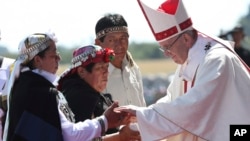Pope Francis presided over Mass Wednesday in the Chilean town of Temuco, the heart of a centuries-old conflict with indigenous people regarding land that was taken from them in the early 20th century. It is an area the pope said was the site of "grave human rights violations."
After leading about 150,000 people in silent prayer, Pope Francis said the natural beauty of the Araucania region in central Chile was blessed by God and cursed by man.
Mass was celebrated at Maquehue Air Base, which was built on land seized from the Mapuche people and used as a detention center during the 1973-1990 dictatorship of Gen. Augusto Pinochet.
"We offer this Mass for all those who suffered and died, and for those who daily bear the burden of those many injustices," the pope said.
The long-running conflict in the Araucania region occasionally erupts in violence, as it did just hours before the pope celebrated Mass when a school and an adjourning church in the nearby city of Collipulli were partially burned. In the last week, 10 Catholic churches were firebombed, mostly in the Araucania region, where many of Chile's estimated 1 million people of Mapuche descent live.
No group has claimed responsibility for the violent acts, and no arrests have been made, but Mapuche activists have torched churches in recent years to promote their cause.
Prosecutor Enrique Vasquez told reporters at the scene of Wednesday's blaze that investigators found a sign and pamphlets demanding the release of Mapuche prisoners.The pope urged the Mapuche people to reject violence, saying "You cannot assert yourself by destroying others, because this only leads to more violence and destruction."
He also asked the Chilean government to go beyond negotiating "elegant" agreements with indigenous people and actually implement them.
Pope Francis, an Argentine native and the first pope from Latin America, hopes to leverage his weeklong trip to Chile and Peru to raise global awareness of the plight of indigenous people.
In his initial remarks Tuesday in Santiago, the pope urged Chileans to listen to indigenous peoples who are "often forgotten, whose rights and culture need to be protected lest that part of this nation's identity and richness be lost."
The pope's comments resonated quickly in the Mapuche community, including with Hugo Alcaman, president of a Mapuche group that promotes local business development and social change.
"Saying that we should be respected, that we have a right to exist and be recognized is all very strong," Alcaman said. "It's Chile that has to respond, especially politicians."
Mapuche and Chilean government leaders have said they hope Pope Francis can facilitate dialogue. Their conflicts began in the late 19th century, when the government eventually defeated the Mapuche, who had fiercely withstood Spanish and other European settlers for centuries.
The Mapuche have demanded ownership of their ancestral lands in the southern Araucania region, legal recognition of their culture and language, and an end to discrimination they contend makes them police targets.
The pope's visit to Temuco comes one day after meeting in Santiago with survivors of clerical sex abuse. The pope wept with them and asked forgiveness for the "irreparable damage" they suffered as children when they were were sexually abused by priests — a scandal that has damaged the Catholic Church's integrity and cast a pall over the pope's first visit to the country.
Chile's most infamous pedophile priest, Rev. Fernando Karadima, was punished to a lifetime of "penance and prayer" after victims publicly disclosed their accusations in 2010 following years of complaints to church officials that he kissed and fondled them when they were teenagers.
Many Chileans are still angry over the pope's 2015 decision to appoint Karadima protege Juan Barros bishop of the southern city of Osorno. Barros' controversial appointment has divided the diocese, as he denies being aware of Karadima's abuse.
The U.S.-based NGO Bishop Accountability reported last week that nearly 80 Catholic clergy members had been accused of sexually abusing Chilean children since 2000.
A recent Latinobarometro survey said the crisis triggered a sharp drop in the number of Chileans who consider themselves Catholic, as well as a decline in confidence in the church as an institution.
The distrust extends to Pope Francis in Chile, a country that gives him the lowest approval rating among the 18 Latin American countries in the survey.






